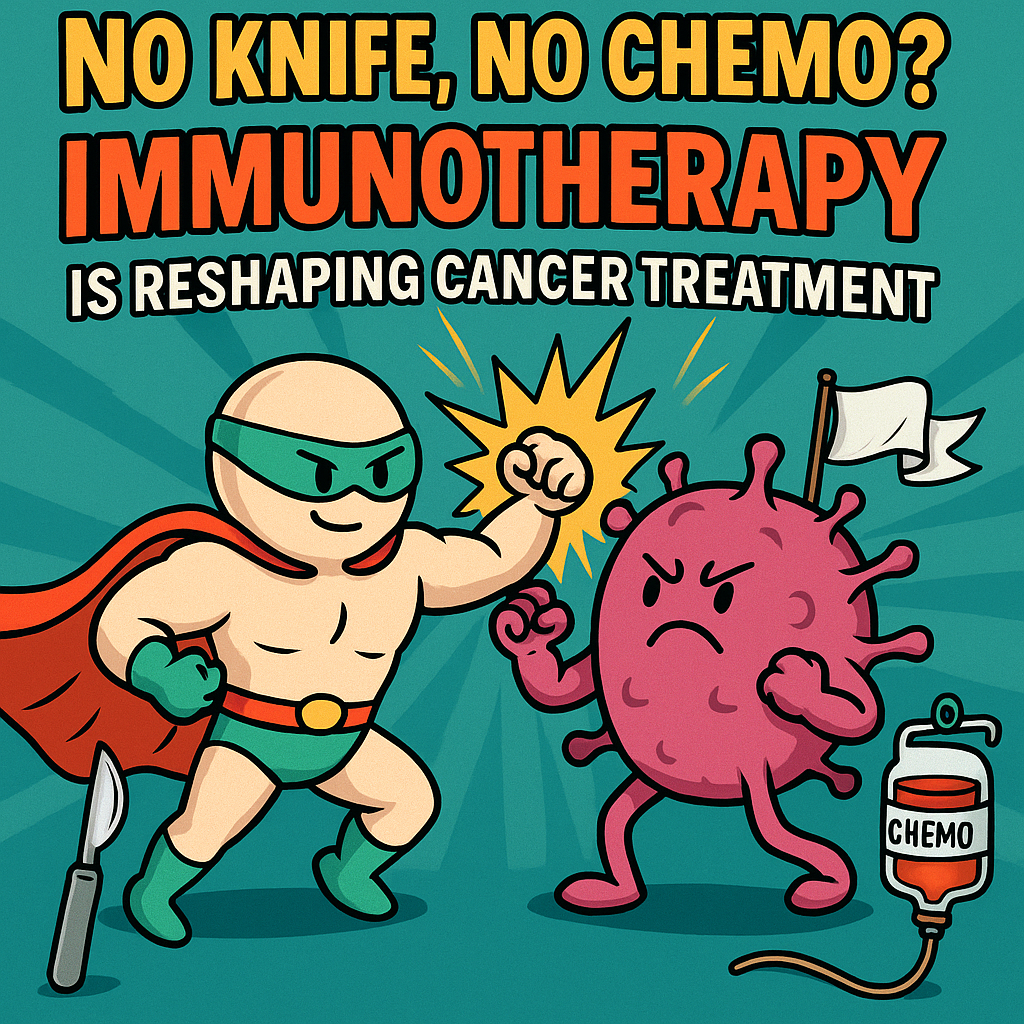💉 No Knife, No Chemo? How Immunotherapy Is Reshaping Cancer Treatment

Health & Sciences | The Varrock Street Journal
Good morning, readers!
Imagine hearing the words “you have cancer”—and instead of preparing for major surgery or months of grueling chemotherapy, your treatment plan is a short course of immunotherapy… and that’s it.
It might sound futuristic, but new clinical data shows this could soon be a reality for certain patients.
In today’s newsletter, we explore breakthrough findings suggesting that for a subset of cancer patients, immunotherapy may be powerful enough to eliminate tumors entirely—without the need for traditional treatment.
🧬 What’s the Breakthrough?
According to a recent report from NBC News, researchers found that some cancer patients who received only immunotherapy showed such a strong and complete response, they no longer required surgery, radiation, or chemotherapy.
The study, presented at the American Association for Cancer Research annual meeting, focused primarily on rectal and lung cancers. Key points include:
- Rectal cancer patients with a specific genetic mismatch repair mutation (dMMR) were given dostarlimab, a type of checkpoint inhibitor.
- In 12 patients, the tumor disappeared completely after immunotherapy alone.
- For some, that meant avoiding life-altering surgeries, like colostomies.
Dr. Andrea Cercek, co-leader of the research, described the results as “unprecedented” and “paradigm-shifting.”
👉 Read the full NBC article here
🧪 What Is Immunotherapy?
Immunotherapy works by activating the body’s own immune system to recognize and attack cancer cells. This can be especially effective in cancers that have:
- Mismatch repair deficiencies (dMMR)
- High microsatellite instability (MSI-H)
- Checkpoint molecule expression (e.g., PD-1, PD-L1)
Unlike chemo, which kills all rapidly dividing cells, immunotherapy is more targeted—with fewer long-term side effects.
Here is a helpful video for breaking down what immunotherapy is.
🔬 Scientific Spotlight: The Rise of RNA Virus-Based Immunotherapy
In addition to checkpoint inhibitors, synthetic RNA virus immunotherapy is being explored as a revolutionary new way to treat cancer.
A 2022 study published in Nature Communications titled "Development of intravenously administered synthetic RNA virus immunotherapy for the treatment of cancer" shows promising early data:
- Synthetic RNA viruses are engineered to directly attack tumor cells.
- These viruses also stimulate a broader immune response, essentially alerting the body to recognize and destroy cancer on its own.
- This method is being designed to work without surgery, radiation, or chemotherapy—just smart, targeted immunological control.
This research supports a growing shift in oncology: empowering the immune system as the first—and sometimes only—line of defense.
🩻 Why This Matters
The idea of skipping surgery or chemo isn’t just about comfort—it’s about quality of life:
- No hair loss or nausea
- No permanent stomas or physical disfigurement
- Fewer hospital stays
- Lower long-term side effects like nerve damage or infertility
For eligible patients, this shift could mean fighting cancer without losing their identity or independence.
🌟 Spotlight on the Future
This research is just the beginning. Scientists are now asking:
- Can this approach be used for other cancer types (like esophageal or bladder)?
- How do we predict who will respond completely—and who won’t?
- Can we avoid overtreatment and personalize therapy based on genetics?
The future of oncology may not be a "one-size-fits-all" chemo plan—but a precision medicine model, tailored to the biology of each tumor.
Here is a quick video talking about it!
😲 Did You Know?
- In 2022, the FDA approved dostarlimab for dMMR endometrial cancer—now it’s being studied in colorectal and other solid tumors.
- Up to 15% of colorectal cancers may have mismatch repair deficiencies—potential candidates for chemo-free treatment.
- Some cancer centers are already launching “watch and wait” programs for patients whose tumors fully disappear after immunotherapy.
🧠 Reflection Questions
- Should standard cancer care evolve to include chemo-free paths as first-line options?
- How can genetic testing be expanded to identify who might benefit from this treatment?
- What role should shared decision-making play in choosing between surgery and immunotherapy?
👋 Final Thoughts
Cancer care is evolving—and with it, hope is growing. This breakthrough reminds us that the future of medicine lies not only in stronger treatments—but in smarter ones. If fewer side effects and preserved quality of life are possible, then these advances are more than medical—they’re deeply human.
📚 References
NBC News. (2024, April 15). Some cancer patients may be able to skip surgery and chemotherapy, studies show. https://www.nbcnews.com/health/cancer/cancer-patients-immunotherapy-may-way-skip-surgery-chemo-rcna203038
Cercek, A., et al. (2024). Immunotherapy-only responses in mismatch repair-deficient rectal cancer. Presented at the American Association for Cancer Research Annual Meeting.
Kennedy, E. M., et al. (2022). Development of intravenously administered synthetic RNA virus immunotherapy for the treatment of cancer. Nature Communications. https://www.ncbi.nlm.nih.gov/geo/query/acc.cgi?acc=GSE262545
American Cancer Society. (2024). How Immunotherapy Is Changing Cancer Treatment. https://www.cancer.org
📲 Stay updated with cutting-edge care:
- Instagram: @thevarrockstreetjournal
- TikTok: @varrock.street.jo
